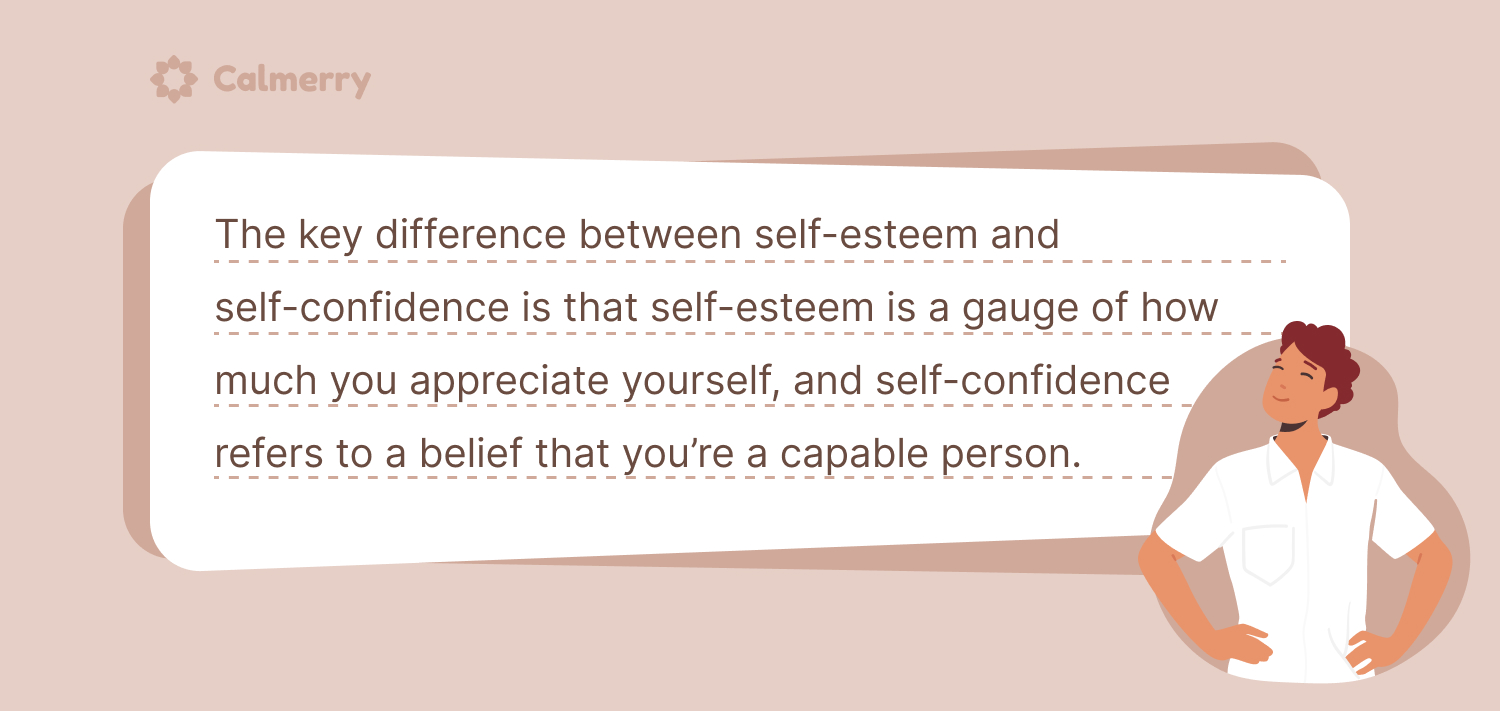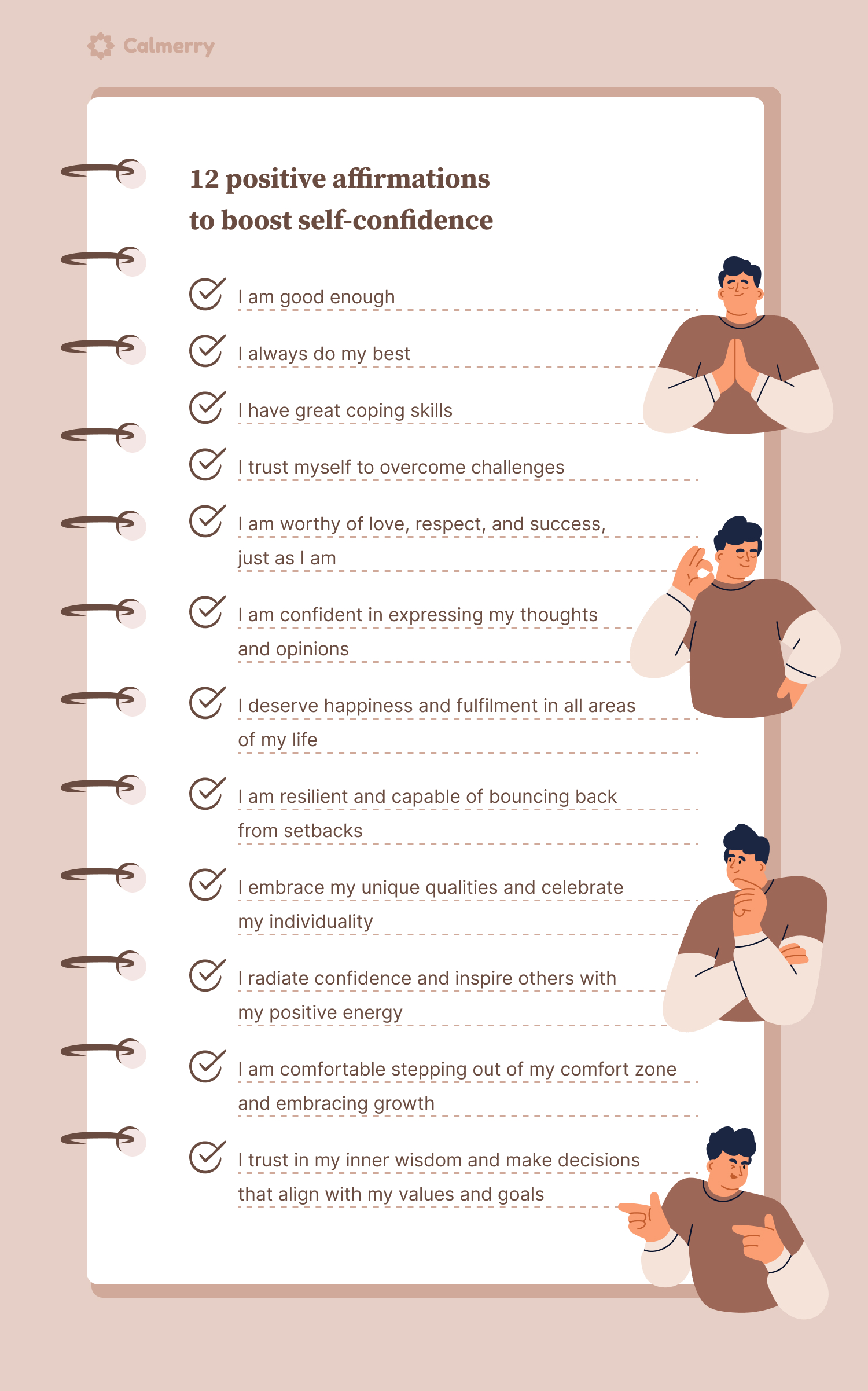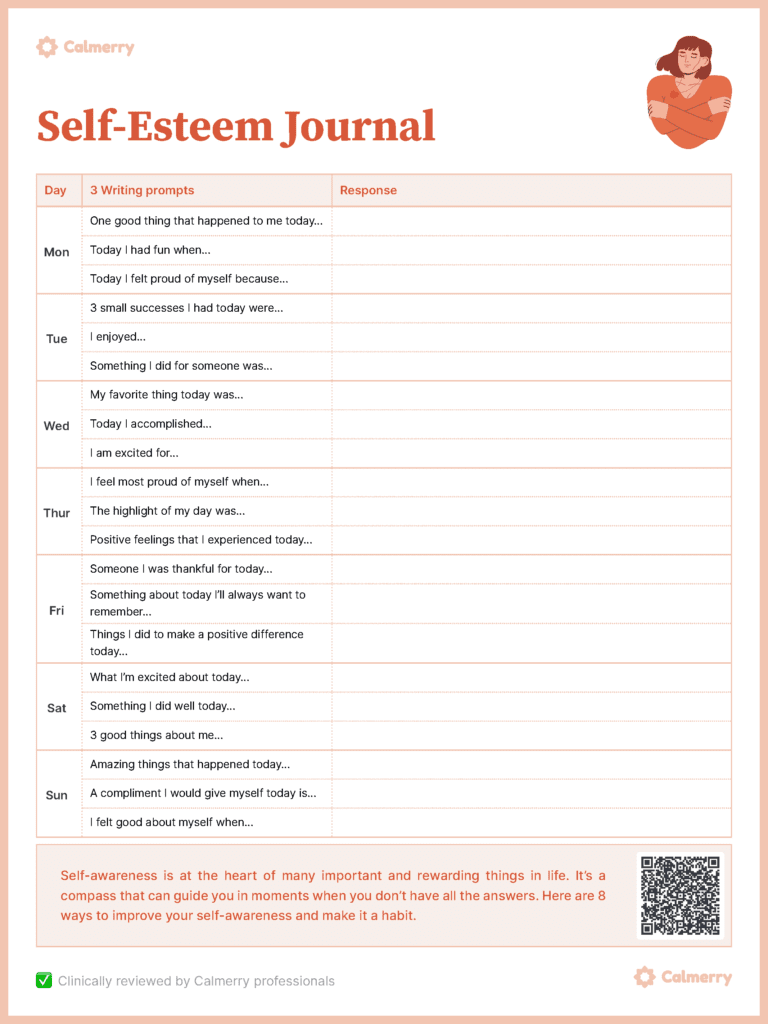Self-Esteem vs. Self-Confidence – Key Difference and How to Improve the Two

In this article
Even though low self-esteem and self-confidence might not always be visible to others, those with them may struggle with frequent negative thoughts about themselves and find it more difficult to cope with life’s challenges.
Sounds familiar? In this article, you’ll find out the key difference between self-esteem vs. self-confidence and some tips on how to build them up.
You’ll also understand what self-worth is and how it relates to the other two.
Difference between self-esteem, self-confidence, and self-worth

Self-esteem, self-confidence, and self-worth are three concepts that determine how we feel about ourselves and interpret our life experiences.
Let’s take a closer look.
What is self-esteem?
Self-esteem is a measure of how much you value and appreciate yourself as a person. It encompasses your overall sense of self-worth and self-respect. And it reflects your level of regard and love for yourself, regardless of specific abilities or skills.
Humans tend to evaluate themselves based on the information they receive from the outside world, such as praise from other people. The goals you achieve and the difficulties you face might influence your beliefs about yourself and translate into low or high self-esteem.
For example, poor academic or work performance might make you feel like you aren’t good enough, while the approval of others might have the opposite effect.
Your self-esteem might depend on the following:
- Your mood
- How you handle stressors in your life
- Whether you reached or failed a goal
- Comparison between yourself and others
- Positive or negative feedback from other people
Self-esteem can also tell you how you perceive yourself compared to others. Overly high self-esteem means you see yourself as superior to others, low self-esteem is associated with feeling inferior, while healthy self-esteem gives you a balanced view of your qualities and abilities.
It may be a good idea to take a self-esteem test to see which category you fall into.
What is self-confidence?
Self-confidence can be defined as a perceived ability to cope with various situations. It’s the belief in your own abilities, skills, and competence to accomplish specific tasks or goals.
Self-confidence is often task-specific and can fluctuate in different areas of life or within different skill sets. It’s built through experiences, achievements, and overcoming challenges, leading to a positive assessment of your abilities and a belief in your capacity to achieve success.
A confident person believes they’ll effectively deal with obstacles, which allows them to be assertive, pursue their goals, and be their true selves.
Self-esteem vs. self-confidence
The key difference between self-esteem and self-confidence is that self-esteem is a gauge of how much you appreciate yourself, and self-confidence refers to a belief that you’re a capable person.
Both are important for personal well-being, and they can influence each other.
Self-worth vs. self-esteem
Self-worth refers to the inherent belief and recognition that you are valuable and worthy, regardless of external factors. It’s rooted in a deep understanding of your intrinsic worth and is often influenced by your core beliefs about yourself.
Self-esteem and self-worth are somewhat similar concepts with some differences:
- Self-esteem might be easily affected by what happens in your life. It’s more contingent on external validation and can fluctuate depending on various factors in different areas of life, such as success, failure, feedback from others, or comparison with others.
- Self-worth is a complex concept that can be influenced by both core beliefs and life experiences. But it’s a fundamental sense of self-acceptance and self-love that remains relatively stable and resilient, even in the face of negative experiences or setbacks – although can be impacted by them.
For example, if your core belief is that you’re worthy of love, being rejected by a romantic partner may less likely affect your self-worth. But it might more likely temporarily lower your self-esteem.
How to improve your self-esteem, self-confidence, and self-worth? 8 practical tips
It’s normal to sometimes undervalue yourself in response to setbacks. But chronic low self-esteem might indicate low self-worth, which is more consistent over time and thus more difficult to change.
Low self-worth also leads to a lack of confidence and a reduced ability to cope with life’s challenges. Additionally, studies show that self-esteem is directly linked to happiness and other positive outcomes for your well-being.
Here’s how you can work on all three and live a more fulfilling life:
1. Support your well-being every day, especially when you need it most
Self-esteem can be fragile and fluctuate depending on what’s going on in your life. If your relationship falls apart or you aren’t succeeding professionally, it might be difficult to feel good about yourself.
Since the factors that negatively impact your self-esteem are often out of your control, it’s important to practice self-care every day, even when things are going well.
Your self-care plan can include any activity that allows you to relax and be in the moment, such as:
- Going for a walk
- Having a bath
- Cooking
- Reading
- Journaling
- Practicing yoga or meditation
When you take the time to nourish your well-being, you cultivate self-love and make your health a priority. The stronger your connection with yourself is, the easier it will be for you to cope with life’s obstacles in the future.
The next time your self-esteem takes a hit, you’ll know how to ground yourself and recover faster.
2. Get out of your comfort zone
One of the effective ways to improve your self-esteem and confidence is to get out of your comfort zone. The key is challenging yourself in small ways, whether setting a new goal or taking more initiative when interacting with people.
Putting yourself in a challenging situation might seem counterproductive as it comes with some level of uncertainty. But it can give you a sense of achievement.
With frequent practice, you’ll have more faith in your abilities and confidence to cope with any outcome.
3. Train your mindset to focus on the positives about yourself
One of the factors that might impact your self-esteem is your mindset. If you focus on what you lack, finding peace and happiness will be an uphill battle.
Remember that you deserve to feel good about yourself regardless of your shortcomings.
Firstly, make sure that you recognize your strengths. We tend to hold ourselves to high standards and care about superficial qualities too much. For example, you might judge whether you’re worthy or not based on your professional achievements and attractiveness.
Interestingly, when we think of our friends and what makes them amazing people, we might focus on a very different set of traits, such as kindness or honesty.
Remember that materialistic things and titles you have are not the best indications of your worth. Try to make a list of character traits that make you a valuable person and refer to them whenever you need a confidence boost.
4. Go back to your journal
You can also train your mind to pay attention to the positives by keeping a gratitude diary listing things that make you happy.
It’s easy to focus on the negatives, but no matter how bad things are, there’s always something to be grateful for – like people who love you, your health, your journey, your little inspirations of today, or just gorgeous you!
Write those small and big moments – practice daily for maximum benefits.
Maintaining a self-esteem journal is an excellent way to initiate a reflection on your positive actions and experiences, fostering a positive perspective on life.
Unsure of what to write? Download this PDF worksheet featuring three daily journaling prompts for each day of the week 👉 Self-Esteem Journal Worksheet
5. Avoid social comparison on social media
When you’re working on your self-esteem, social comparison may be your biggest obstacle. One way to avoid it is to make a conscious effort to manage the time spent (and its quality) on social media.
A digital detox can do wonders for your mental health because it gives you fewer opportunities to compare yourself to others. After all, most people’s feed is about highlighting their achievements, not talking about their true problems.
Additionally, content on social media is often edited, and previous studies showed that exposure to manipulated photos can negatively affect your self-esteem and confidence.
So try to take these steps:
- Manage your feed
- Follow those who inspire you and unfollow those who affect your mental health
- Join supportive communities
- Unplug and take a break if needed
- And concentrate on the world around and within you more
6. Practice self-compassion and kind self-talk
If you’re harsh on yourself, you aren’t alone. People with low self-esteem and self-confidence don’t always treat themselves with kindness and tend to focus on their failures.
An important part of improving your self-esteem and confidence is becoming more self-compassionate towards yourself. This might be as straightforward as reminding yourself that it’s okay not to be perfect whenever you make a mistake.
You might also need to become more mindful of how you talk to yourself. If you’ve had low self-esteem for a while, you might be so used to putting yourself down that you don’t notice when negative thoughts appear in your mind anymore.
You might subconsciously reaffirm the negative beliefs such as “I have no confidence…” which become a self-fulling prophecy.
If you want to boost your self-confidence and improve your self-image, start cheering yourself on with positive affirmations. For example:
- I am good enough
- I always do my best
- I have great coping skills
- I trust myself to overcome challenges
- I am worthy of love, respect, and success, just as I am
- I am confident in expressing my thoughts and opinions
- I deserve happiness and fulfillment in all areas of my life
- I am resilient and capable of bouncing back from setbacks
- I embrace my unique qualities and celebrate my individuality
- I radiate confidence and inspire others with my positive energy
- I am comfortable stepping out of my comfort zone and embracing growth
- I trust in my inner wisdom and make decisions that align with my values and goals

7. Reevaluate your friendships
Emotional support is the foundation of a healthy friendship.
If your friends spend time with you but refuse to offer support when things get tough, you might feel the pressure always to put on a happy face. This might impact your mood and encourage more negative thoughts about yourself.
Pay attention to how you feel when interacting with your friends and be ready to let go of relationships that don’t serve your mental health.
If you already have self-confidence issues, the last thing you need is people who make you feel like you’re a burden.
8. Seek professional support
Core beliefs are formed early in life when our experiences shape who we are and provide a foundation for future learning which makes them resistant to change.
Negative beliefs can be particularly challenging because they are often a result of a history of abuse and trauma. For this reason, the most effective way to work on them is therapy.
Another part of self-esteem counseling is challenging behaviors that resulted from a lack of confidence or social anxiety, such as avoiding public spaces.
You can either receive support in person or try online therapy.
At Calmerry, a trained therapist can help you identify core beliefs that aren’t useful and transform them into beliefs that allow you to have a healthier relationship with yourself.
Final thoughts
If you’ve never considered working on a relationship with yourself before, the above tips might be overwhelming.
However, where you start doesn’t matter because self-esteem, confidence, and self-worth are all related. If you improve one, it with help improve the other, and vice versa.
Prioritize your health and get support if you need it. You got this!
online therapy
live video session




